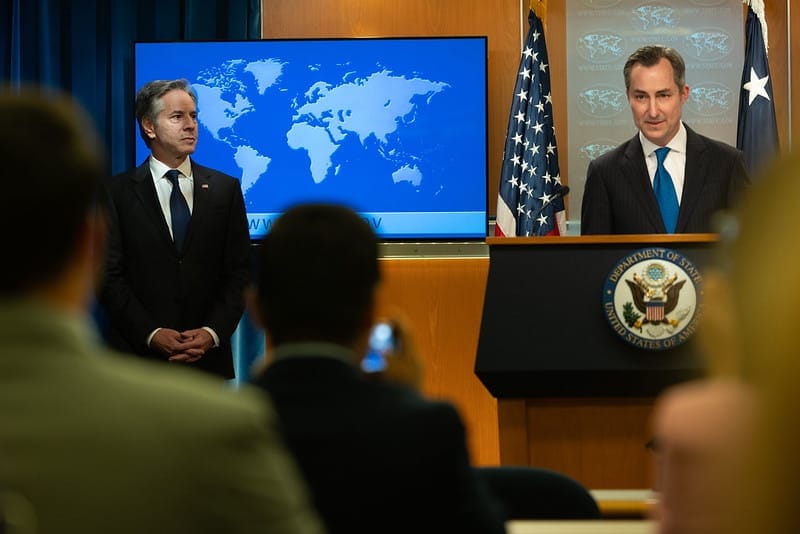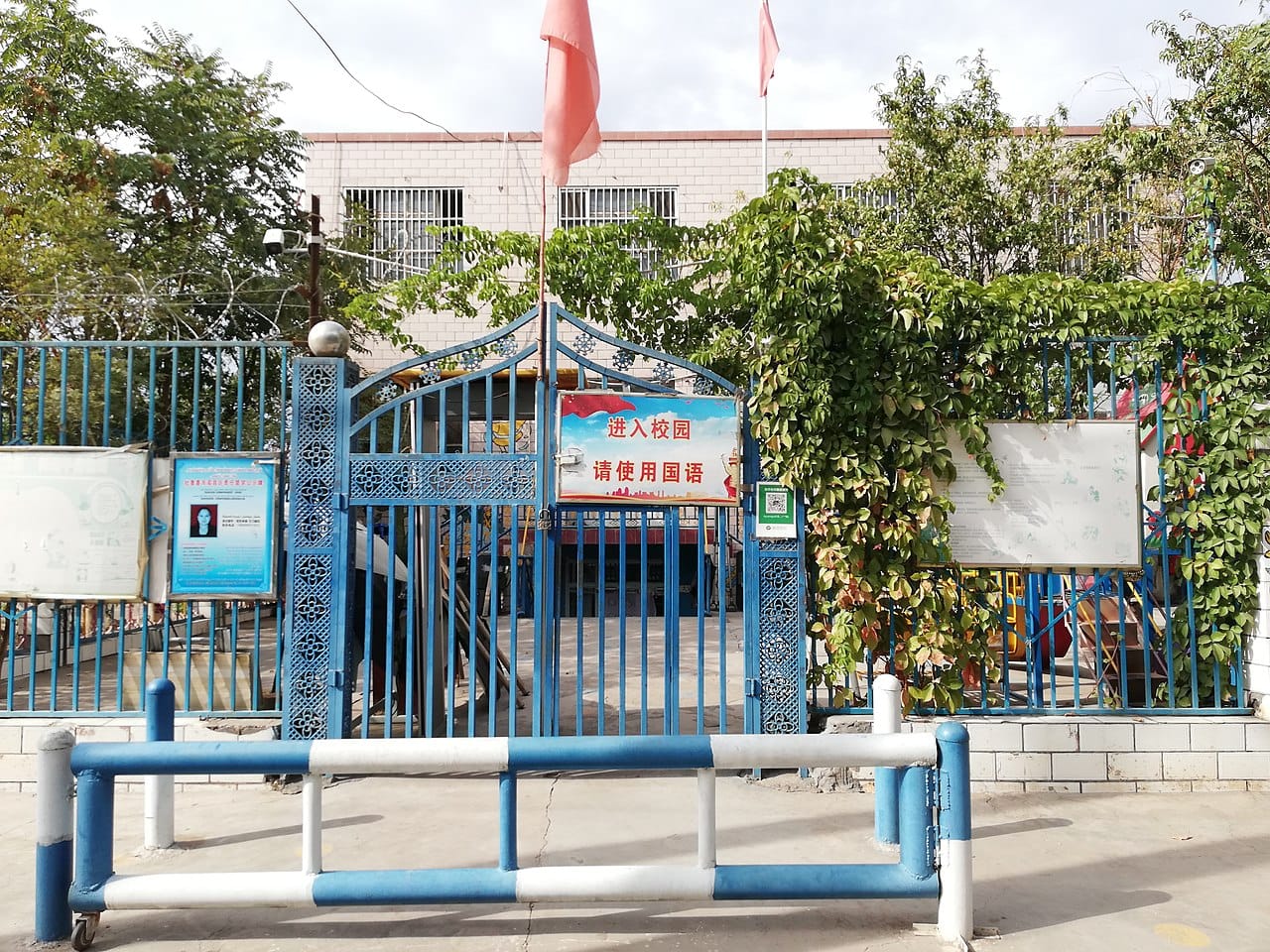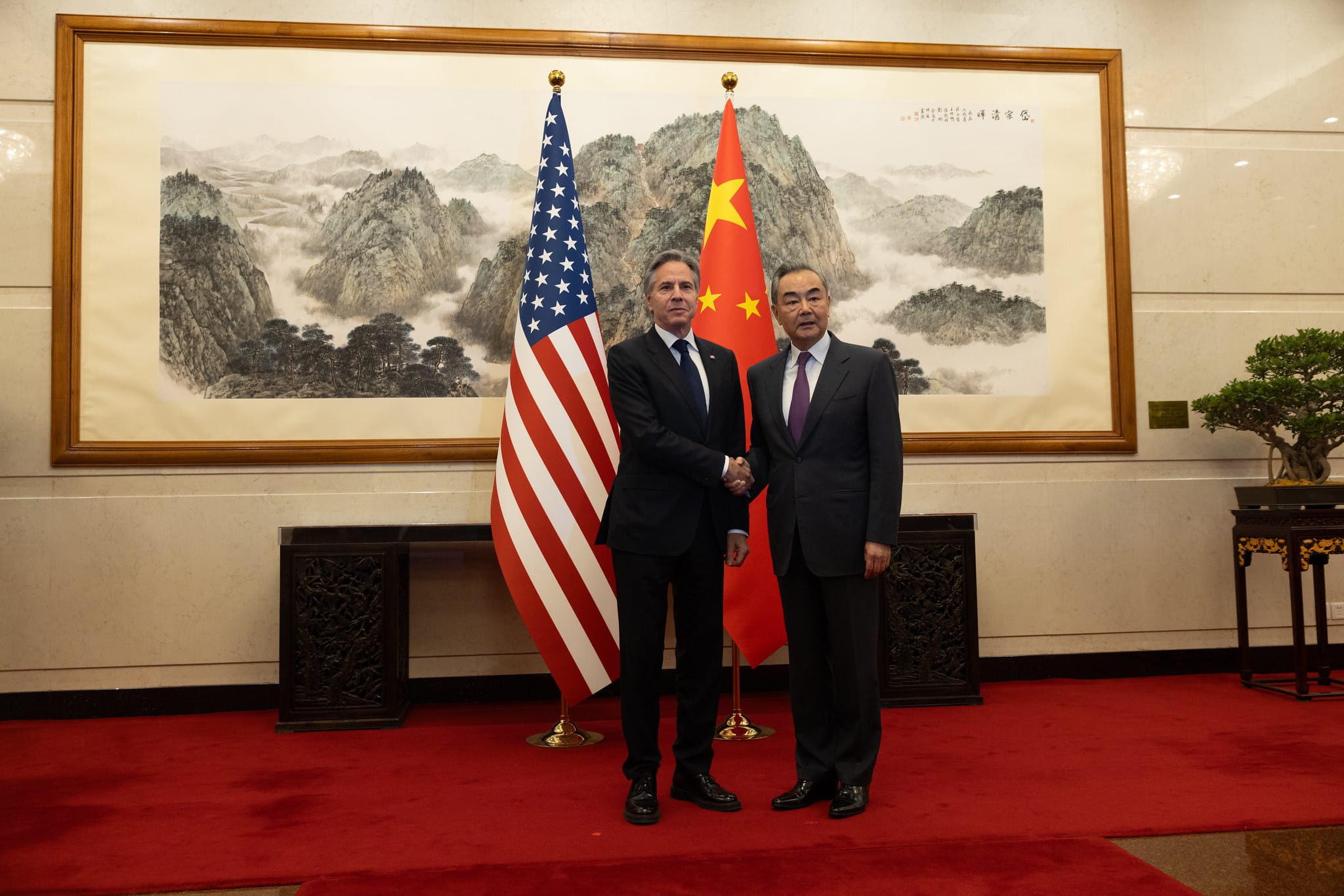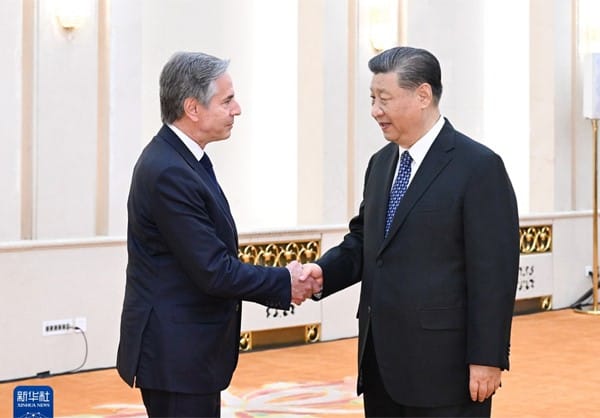EVENTS
After Report on China’s Human Rights Practices, US-China Agreements Come into View

On April 22, 2024, the Department of State released its 2023 Country Reports on Human Rights Practices. Mandated by law, the reports, which have been released every year since 1977, inform the executive branch (e.g., executive orders mandating sanctions) and congressional legislation (bills and resolutions). The reports cover developments in nearly 200 countries that took place in 2023 and reflect US priorities as far as human right practices in those countries is concerned.
The China section, which covers developments on the Mainland, Hong Kong, Macau, and Tibet (there is also coverage of developments in Xinjiang), is typically released in March. The April 22 release date is the latest release date in recent memory.
Secretary Antony Blinken made opening remarks that provide a glimpse of US priorities in formulating human rights policies. There were no mentions of Mainland China, Hong Kong, Tibet, or Xinjiang. He then turned over the podium to the senior officer of the Bureau of Democracy, Human Rights, and Labor, Robert Gilchrist. Blinken took no questions on China while Gilchrist took one.
Scant Attention to Rahile Dawut
In the country report on China, there was only one mention of imprisoned scholar Rahile Dawut. She was lumped together with other Uyghur and Han political prisoners. The report ignores the press statement put out in late September by Dui Hua which confirmed her life sentence despite the fact that the statement formed the basis of dozens of articles in English language media. (The statement garnered more than 10,000 page views on Dui Hua’s website.) The State Department report mentions Xinjiang 82 times and Uyghurs 51 times.
The 2023 country report is similar to reports filed in recent years. It refers to China as an authoritarian state (as opposed to a totalitarian state) and refers to “genocide” in Xinjiang (the government of the United States remains the only government in the world to call what’s going on in Xinjiang “genocide.”) There are no changes in the titles or order of the sections of the report.

The Hong Kong section dwells at length on the national security legislation imposed by Beijing in 2022, and the run-up to the legislation passed by the Legislative Council in 2024. It mentions the arrests, forced exiles, shutting down of publications, and denial of visas to journalists and academics. The trial of Jimmy Lai is covered. The section on Macau states that there were no significant changes in 2023. It praised Macau, compared to Hong Kong.
The section on Tibet reported no significant changes in 2023 before listing a long series of human rights abuses in the Tibet Autonomous Region.
As with past country reports on China, the 2023 report focuses solely on negative developments and ignores positive developments. There is no mention, for instance, of juvenile justice reform that has led to significant improvements in the treatment of juvenile offenders. Nor is there any mention of Dui Hua’s dialogue with the Chinese government on prisoners and prison conditions. This has not always been the case.

The day after the report was issued, Secretary Blinken departed for a three-day trip to China where he met with Foreign Minister Wang Yi and President Xi Jinping. On the day Blinken arrived in China, Ministry of Foreign Affairs spokesman Wang Wenbin issued a strongly worded, lengthy rebuttal of the country report, accusing the United States of having a double standard and pointing out that the United States is plagued by many human rights violations including racism, poverty, and gun violence. To date, the State Council Information Office has not released its report on human rights violations in the United States.
Following Blinken’s meeting with Xi on April 26, he gave a press conference and individual interviews to journalists at the US embassy. He said that he had raised human rights, presumably with Wang Yi, including individual cases.

In the interview with NPR, Blinken described the US and China as being far apart on important international issues, especially on the Russian invasion of Ukraine. When Blinken told Chinese leaders that it would be in their interest to stop helping Russia, China responded by accusing the United States of being a “hypocrite” for making such a complaint while supporting Ukraine.
The priority for Blinken was raising China’s supply of material to Russia to assist them in its war on Ukraine. Other subjects he may have raised include China’s role in fentanyl trafficking; the detention of American citizens in China (priorities are Mark Swidan, Pastor Davin Lin, and Kai Li); aggression in the Taiwan Strait, the South China Sea, and the East China Sea; China’s failure to rein in the nuclear threat posed by North Korea; predatory trade practices; and alleged Chinese support of Iran and Hamas.

China’s Ministry of Foreign Affairs issued its own summary of the meeting with Wang Yi, claiming that Wang and Blinken reached a five-point consensus, including:
- working to stabilize and develop China-US relations;
- maintaining high-level exchanges and contacts at all levels;
- holding the first meeting of the China-US Intergovernmental Dialogue on Artificial Intelligence;
- expanding people-to-people and cultural exchanges, and;
- maintaining consultations on international and regional hotspots.
Developments on these agreements have been slow going, with the State Department largely staying mum about these agreements until mid-May. The first meeting of the China-US Intergovernmental Dialogue on Artificial Intelligence took place in Geneva on May 14, 2024. The meeting to discuss “technical risks” took place as the United States rolled out new tariffs on “strategically sensitive” imports such as semiconductors, electric vehicles, and solar equipment, only days after a climate talk on May 8 in Washington, DC. China’s Commerce Ministry said that it “firmly opposes” the tariffs and that they “impact the atmosphere of bilateral cooperation.”
On May 13, 2024, China announced that it is open to talks on cross-border smuggling and deportation of Chinese illegal immigrants. As of publication, no further details were made available.
Americans increasingly view China as an enemy and think that the United States should prioritize limiting its influence, according to recent polling.
Pew Polling conducted April 1-7 shows widespread dislike of China among the American public: 81 percent of respondents view the country unfavorably, including 43 percent who view the country “very unfavorably.” Pew noted that “China has been seen unfavorably by three-quarters or more of US adults since 2020.”
Also of note, 42 percent see China as an enemy, an increase from 38 percent in 2023. This is the largest share of the population to describe China as an enemy since Pew began asking the question, even though an even larger share of Americans view China as a competitor – 50 percent of respondents. In a NewsNation poll asking about “the bigger threat to the United States today,” China was the most popular answer, with 41 percent. Its closest competitor was Russia at 27 percent.
An Economist/YouGov poll taken April 21-23 also shows that China’s favorability remains at historically low levels: 76 percent view China as unfriendly or an enemy, 10 percent see China as friendly or an ally, and 13 percent are not sure. In a 2023 Economist/YouGov poll taken April 22-25, 72 percent answered unfriendly/enemy; 17 percent answered friend/ally; and 10 percent were not sure.
US public opinion of China appeared to slip again in October 2023 survey in the run-up to the APEC summit in San Francisco, reaching 76 percent. Favorability rebounded slightly in December, with 72 percent viewing China as unfriendly/an enemy, but favorability ratings have since returned to October levels.
TIPP’s polling conducted May 1-3 asked Americans to grade Biden’s handling of China, and his administration’s marks are largely unsatisfactory: 27 percent give him a failing grade; 19 percent a poor grade; 21 percent an average one; 14 percent a good one; and 8 percent an excellent one; 9 percent were unsure. While Democrats are more satisfied with Biden’s China policy, disapproval is high among independents (52 percent) and Republications (75 percent).
PUBLICATIONS HIGHLIGHTS
Dragon Years: Remembrance of Times Past: 1988
From the Encounters with China podcast, Dragon Years is a limited podcast series exploring key periods of the US-China relationship and John Kamm’s advocacy. Each episode in this five-part series focuses on a different Year of the Dragon, beginning in 1976 and concluding with 2024.

The latest episode of Dui Hua’s limited podcast series, Dragon Years: Remembrance of Times Past flashes back to 1988, the Year of the Earth Dragon. China is reckoning with floods, increased foreign trade, and calls for reform. In Episode 2, John Kamm speaks with Richard Glover, a pioneer and veteran of US-China trade. The two former colleagues discuss how their paths crossed, the politics of doing business in China in the lead-up to Tiananmen, and what lessons 1988 has for today’s China watchers.
All Business is Local: The Macau Subcommittee
From John Kamm Remembers, a series written by Dui Hua’s founder recounting his advocacy for prisoners in China.

John Kamm Remembers goes back to 1980s Macau. Working in the chemicals trade in China, Kamm becomes more active in the Hong Kong American Chamber of Commerce. In this role, he arranges a business delegation to the former Portuguese territory of Macau. The delegation sends Kamm back to Macau, where he learns important lessons about business, politics, and life in a changing China.
Gray Matters: China’s Aging Prisoners
From the Human Rights Journal, a blog offering original analysis and translations related to human rights and rule of law developments in China.

There is a dearth of information about elderly prisoners in China (Dui Hua estimates the figure to be between 88,000 and 104,000), but Chinese legal experts generally agree that the number of elderly prisoners has been surging. This Human Rights Journal entry explores the different types of elderly crime, trends in leniency and clemency for elderly prisoners, and how elderly political prisoners may face discriminatory treatment when incarcerated.
PRISONER UPDATES
Dui Hua’s Prisoner Updates provide the latest information staff researchers have uncovered through online and library research and through direct dialogue with the Chinese government.
Hainan teacher sentenced for inciting subversion; Peng Yuhua – convicted with Li Ming-cheh in a 2017 subversion case – released; China Democracy Party leader, Xu Guang, sentenced again; Migrant worker turned labor activist arrested; Falun Gong practitioner received third clemency in Guangdong; Falun Gong practitioner in Beijing facing trial again; Wang Quanzhang & family live under surveillance & harassment, four years after his release.
